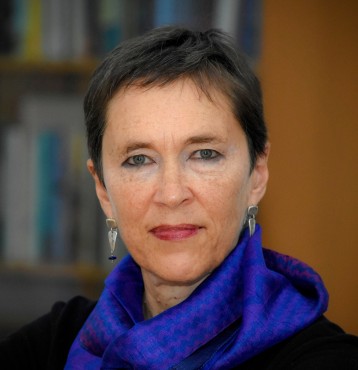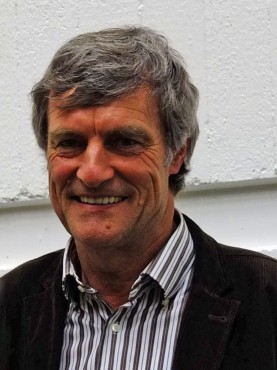 Prof. Dr. Caroline A. Jones is Professor in the History, Theory, Criticism section of the Department of Architecture, also serving as Associate Dean for Strategic Initiatives in the School of Architecture and Planning at MIT. She studies modern and contemporary art, with a particular focus on its technological modes of production, distribution, and reception, and on its interface with sciences such as physics, neuroscience, and biology. Her essays on modern and contemporary art have appeared in journals ranging from Artforum to Critical Inquiry to Science in Context; she is solo author of several books and exhibition catalogues, and a co-editor of volumes that examine technology and the senses, art and neuroscience, and art history and history of science as parallel inquiries. Collaborative work with historian of science and physicist Peter L. Galison will culminate in a book on scientific and viral images of environmental harm, titled Invisibilities: Seeing and Unseeing the Anthropocene (forthcoming with Zone Books at Princeton University press). Her research has been supported with fellowships from the Guggenheim Foundation, the National Humanities Center, the Institute for Advanced Studies, the Radcliffe Institute, the Wissenschaftskolleg zu Berlin, the Max Planck Institute, the National Endowment for the Humanities, the Social Science Research Council, and other foundations interested in interdisciplinary inquiry emerging from art history. Currently researching biologically-active art forms, she is curating the forthcoming exhibition Symbionts: Contemporary Artists and the Biosphere, which will be accompanied by a publication from MIT Press, slated for October 2022.
Prof. Dr. Caroline A. Jones is Professor in the History, Theory, Criticism section of the Department of Architecture, also serving as Associate Dean for Strategic Initiatives in the School of Architecture and Planning at MIT. She studies modern and contemporary art, with a particular focus on its technological modes of production, distribution, and reception, and on its interface with sciences such as physics, neuroscience, and biology. Her essays on modern and contemporary art have appeared in journals ranging from Artforum to Critical Inquiry to Science in Context; she is solo author of several books and exhibition catalogues, and a co-editor of volumes that examine technology and the senses, art and neuroscience, and art history and history of science as parallel inquiries. Collaborative work with historian of science and physicist Peter L. Galison will culminate in a book on scientific and viral images of environmental harm, titled Invisibilities: Seeing and Unseeing the Anthropocene (forthcoming with Zone Books at Princeton University press). Her research has been supported with fellowships from the Guggenheim Foundation, the National Humanities Center, the Institute for Advanced Studies, the Radcliffe Institute, the Wissenschaftskolleg zu Berlin, the Max Planck Institute, the National Endowment for the Humanities, the Social Science Research Council, and other foundations interested in interdisciplinary inquiry emerging from art history. Currently researching biologically-active art forms, she is curating the forthcoming exhibition Symbionts: Contemporary Artists and the Biosphere, which will be accompanied by a publication from MIT Press, slated for October 2022.
 Prof. Dr, Hubert Zapf is an Americanist and Co-Director of Environmental Humanities at the University of Augsburg, Germany. He is a faculty and board member of the joint Augsburg-Munich International Doctorate Program Rethinking Environment: The Environmental Humanities and the Ecological Transformation of Society, funded by the Elite Network of Bavaria. His main areas of research are Anglo-American and Comparative Literature, Cultural Ecology, Literary Theory and History, and the Environmental Humanities. His publications include Literature and Science. Ed. Anglia 2015; Handbook of Ecocriticism and Cultural Ecology. Ed. De Gruyter 2016; Literature as Cultural Ecology: Sustainable Texts. Bloomsbury 2016; “Ecological Thought in Europe and Germany.” Global History of Literature and Environment. Eds. John Parham and Louise Westling. Cambridge University Press 2017: 269-285; “Literature, Sustainability, and Survival.” The Value of Literature. Eds. Vera and Ansgar Nünning. Research in English and American Literature 36 (2020): 261-274; ”Ecology in American Literature.“ (With Timo Müller).Oxford Research Encyclopedia of Environmental Science. Oxford University Press, forthcoming)
Prof. Dr, Hubert Zapf is an Americanist and Co-Director of Environmental Humanities at the University of Augsburg, Germany. He is a faculty and board member of the joint Augsburg-Munich International Doctorate Program Rethinking Environment: The Environmental Humanities and the Ecological Transformation of Society, funded by the Elite Network of Bavaria. His main areas of research are Anglo-American and Comparative Literature, Cultural Ecology, Literary Theory and History, and the Environmental Humanities. His publications include Literature and Science. Ed. Anglia 2015; Handbook of Ecocriticism and Cultural Ecology. Ed. De Gruyter 2016; Literature as Cultural Ecology: Sustainable Texts. Bloomsbury 2016; “Ecological Thought in Europe and Germany.” Global History of Literature and Environment. Eds. John Parham and Louise Westling. Cambridge University Press 2017: 269-285; “Literature, Sustainability, and Survival.” The Value of Literature. Eds. Vera and Ansgar Nünning. Research in English and American Literature 36 (2020): 261-274; ”Ecology in American Literature.“ (With Timo Müller).Oxford Research Encyclopedia of Environmental Science. Oxford University Press, forthcoming)


